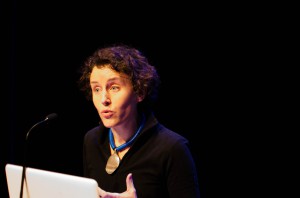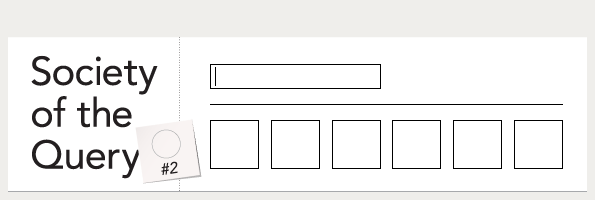Antoinette Rouvroy, in her presentation titled ‘Algorithmic Governmentalities and the End(s) of Critique’, discussed issues surrounding search engines current focus on relationships between sites rather than content.
She began by explaining how modern academic knowledge goes through a series of critiques and peer reviews, while algorithmic knowledge is focused on more predictive aspects, never challenging people or content. An alternative definition of these changes could be summarized as “knowledge without truth.”
 Rouvroy provided three examples of this paradigm shift by highlighting changes in knowledge production, modes of power, and human subjectivity. Knowledge production is a constantly accelerating and evolving process. Today, the vast amounts of raw data available make it difficult, if not impossible, to understand fully.
Rouvroy provided three examples of this paradigm shift by highlighting changes in knowledge production, modes of power, and human subjectivity. Knowledge production is a constantly accelerating and evolving process. Today, the vast amounts of raw data available make it difficult, if not impossible, to understand fully.
More and more of our knowledge production is being controlled, or at least accessed through, machines and search engines. This flow of “signs without signals,” attempting to represent reality, falls short and creates an atmosphere of “significance without symbolism.” The idea that knowledge is not constructed anymore, and merely found by Google and similar engines, has real consequences for humanity.
In this new world quality is determined by the relational infrastructures such as hyperlinks and keywords. When ranking pages, these relations are weighted much more heavily than the content itself, or the truth it may represent. While this system may seem extremely democratic, Rouvroy warns us of the implications of having ephemeral and algorithmic programs determine what we view as knowledge. A implication of this is the dwindling importance of the subject. As big data continues to grow and be analyzed at ever increasing rates, individuals lose forms of identity in order to be included in this knowledge system.
For Rouvroy, this loss of individuation and critique are highly related. She argues there is worth in how older systems of knowledge, such as physical archives, allowed for ideas to be categorized, and then subsequently tested for accuracy. Today these checks on truth are more more difficult to execute. Rouvroy ends by arguing that these new paradigms are “maybe” emancipatory and democratic, but are certainly multifaceted. All of this has created the current state of human/digital interactions as “multitude without alterity,” finding knowledge through difficult to fully understand search algorithms and engines.
Society of the Query #2 – Antoinette Rouvroy: Algorithmic Governmentality and the End(s) of Critique from network cultures on Vimeo.


